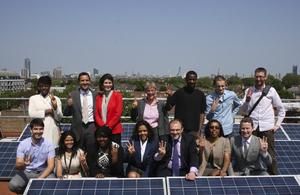Putting local communities at the heart of energy use
Views on how local communities can take charge of managing and generating their own energy are being sought by the Government

Views on how local communities can take charge of managing and generating their own energy are being sought by the Government today, ahead of the UK’s first ever Community Energy Strategy.
This will also deliver a commitment in the Coalition Agreement to encourage community-owned renewables schemes where local people benefit from the power produced.
This comes as new research by Databuild Research and Solutions supported by the Energy Saving Trust showed drivers for people getting involved in community energy projects include economic factors, such as the potential savings to be made on energy bills and the ability to use schemes to tackle fuel poverty. Environmental and social reasons are also cited as important factors.
There are a growing number of community energy projects across the country, from community-run advice services to hydro power turbines in local streams powering hundreds of homes. To reconnect more communities to the energy they use, the Government is looking for views from a range of people and groups to help ensure the new Community Energy Strategy can inspire as many new projects as possible.
For the communities involved, local projects can lead to direct benefits such as lower energy bills or income from the energy generated. They can also help consumers secure better deals through collective purchasing.
Launching the Call for Evidence at the Repowering London project in Brixton, Energy Secretary Edward Davey said:
“Community groups know their local area best, so I want to see them taking control of their own energy projects, generating their own power and shielding themselves against the rising cost of wholesale energy prices.
“This type of collective action has great benefits for local economies, creating jobs, offering the opportunity to develop new skills and injecting investment across the country.
“That’s why we set out a clear commitment to supporting community energy in the Coalition Agreement. Later this year we will publish a Community Energy Strategy, setting out our vision, and a clear plan of action for making it happen.”
Energy and Climate Change Minister Greg Barker added:
“People in villages, towns and cities across the nation are already seeing the real benefits that investing in their own clean green local energy generation can bring.
“But I want to see even more communities taking local power production into their own hands, bringing communities together.
“I would encourage everyone with an interest in this area, from community organisations and local councils to project financiers and energy suppliers to send us their views so we can help make decentralised community energy a reality for many more people.”
Alongside the Call for Evidence, DECC and Consumer Futures have published research today which reviews the evidence behind a range of community energy issues, including the drivers behind local projects and the potential benefits of setting up these type of schemes.
Key findings of the research include:
- Local champions appear to play a vital role in kick starting community energy projects and keeping up the momentum
- The biggest drivers for local community involvement include environmental reasons, such as having a strong interest in climate change, as well as economic reasons, like the potential savings to be made on energy bills, the ability to use schemes to tackle fuel poverty and the exploration of new local business opportunities
- Success of projects depends on a combination of factors including available investment and relevant local skills
- Potential barriers to community schemes include access to funding and buy-in from local residents.
Views on the Community Energy Strategy should be submitted online by 1 August 2013. DECC will publish the Community Energy Strategy in the Autumn.
Notes for editors:
-
The call for evidence for the Community Energy Strategy, including case studies of projects already in action, can be found in the consultations section of GOV.UK
-
The research into community energy issues was carried out for DECC and Consumer Futures by Databuild Research & Solutions Ltd, supported by the Energy Saving Trust. A review of the evidence” can be found in the consultations section of GOV.UK
-
The Community Energy Contact Group (CECG) is an informal advisory body in which community energy experts share views with DECC and help design and deliver policy with communities in mind. More details and a record of CECG meetings can be found on the CECG page